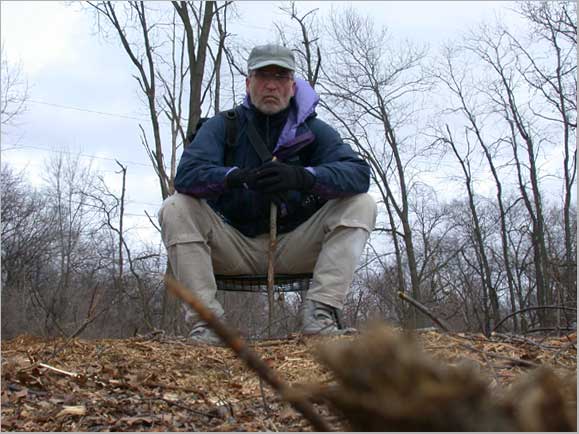
Fieldwork frustrations . . .
In North America, one must always be
prepared to return to a forest area where one has done a bit of
photography/
natural history work and find that it has been cut to the ground.
A fact every school child should learn: only six percent
of the original wild forestlands of North America remains.
That's like saying, of the 34 pages of the Bach's original
Goldberg Variations, only a handful of fragments
is left. Who shall do the work of reconstructing
this music?
In the Picture/Poems Collection,|
index | there's a small
cycle
of longer poems in a narrative voice that speaks in an indirect way
to this theme; it's called
An American
Triptych. The cycle emerges
directly out of a trek through the Pacific Northwest from the south
of Oregon to the North of Washington. I moved slowly, on foot
and by bike, climbing on skis many of the major volcanoes
of the Cascades along the way. A key moment of this
experience was standing on a central peak of the Oregon Cascades,
looking North over the country I would be covering in the
coming weeks. |
View from
Mt. Hood | This is indeed some
of the most wild and beautiful country in North America. At the same
time, after having personally crossed hundreds of square kilometers
of utterly brutal clear cuts, standing there, I couldn't help
feeling a great sense of tragedy and loss. Here then is the
first piece of the cycle, called Roads Without
End:
for Jackie
and her owls
From the
brush of a clear cut,
two bright
eyes leap out at you
and disappear into the night
like images of
some treeless future
flaring up out of the tangled
undergrowth
of destructions past.
In such
darkness,
the rattling
of the empty truck
seems almost hushed, somehow muted,
headlights cutting a
straight line path
down logging roads that know no end.
An echo in the
forest at night, like no other
sound.
The air of the empty spaces
between the trunks of
giant trees
resonates
in stillness
like the deep darkness
between distant stars. But this is
no echo.
A woman calls out
and calls out
again, three sounds each followed
by a slide into silence.
And a
bird replies.
This has happened before, but each
time she stands breathless,
this most primal of dialogues,
two beings no longer alone
in the world.
The flashlight's beam, the
illumination
of which it has no need, the head
slowly turning to
the left.
But the
eyes -- so dark, so utterly motionless.
The woman suddenly senses
how strange this is...
She has come to help but is not
at home here, her movements somehow
out of tune
with the presence that looks
down on her
from the snag above.
She so wants to help,
to carry this bird in her arms
to some safe place, far
away from the smell of diesel
and the ripping, greedy sounds of
saws.
But the
bird says no,
as if it somehow understood
and sensed what was to come.
The woman checks her watch and marks
a map, turns
and walks steeply down
into a thousand
years of patient growth,
and into
the persistent, echoing howl
of a
bird and
the sadness of its
un-
neces-
sary,
ir-
rever-
sible
loss.
(Photograph was made Sunday, the 6th of
April, 2003)
| back to Picture/Poems: Central
Display | go to
P/P Photoweek: Archive
|
|
Map
|
TOC:
I-IV |
TOC:
V-VIII |
Image Index
|
Index
| Text Only
| Download
Page |
Newsletter
|
About
P/P |
About Cliff
Crego |
Photograph by Cliff Crego © 2003 picture-poems.com
(created:
IV.7.2003)
